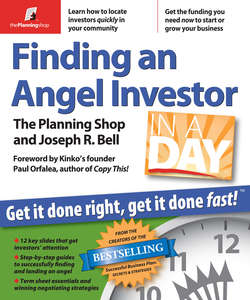Читать книгу Finding an Angel Investor in a Day - Joseph R Bell - Страница 8
На сайте Литреса книга снята с продажи.
Foreword
Оглавлениеby Paul Orfalea,
Kinko’s Founder & Author of Copy This!
In 1970, Paul Orfalea started his business with one copy machine in a tiny space carved out from a hamburger stand in Santa Barbara, California. From that, he built a copying empire, Kinko’s, which was later acquired by FedEx for $2.4 billion.
Wouldn’t it be nice if investors lined up to give you money, and the tough part of fundraising was deciding whose money to take? I’ve been on both sides of the business fundraising table, but building Kinko’s was a little more luxurious than most experiences, because our co-workers were so eager to invest in the company. Rather than a franchise or corporate ownership structure, we created a series of partnerships. Each partnership owned the Kinko’s stores in a geographic area.
Eventually, I had more than 200 partners in 127 partnerships. That’s a lot of investor-partners, and there was no shortage of conflict. But there were also more eyes, ears, and ideas available. When you work with good partners, you’re better able to stay focused on the big picture—to look ahead at ways to grow your company and deal with the major issues, not just the day-to-day problems. You’re able to work “on” your business, not just “in” your business.
Fundraising is never easy. I know that from experience, because we had a very democratic structure at Kinko’s, so I frequently had to sell 200 partners on the necessity of re-investing for growth. It takes more than persistence to raise the money you need. You need to know how to approach people, how to pitch yourself and your ideas, how to get to know the people you’ll be asking for money and eventually working with.
After Kinko’s, I started an investment firm called West Coast Asset Management. While the company focuses on public equities, we also receive many requests from private companies. My partners and I sort through numerous proposals every week, and I’ve been able to see what many entrepreneurs do right—and many more do wrong—when seeking money for their businesses.
As a prospective investor, I look for three things first:
1 1. I want a brief and clear presentation of what the business does, how it makes money, and how it makes money for investors.
2 2. Does the proposal ask for enough money? Liquidity is essential; those who try to impress me with frugality only seem unrealistic about the needs of a young business. I admire frugality, but I invest in reality.
3 3. Does the presenter look me in the eye, shake hands, and demonstrate conversational skills? I prefer to invest in people who function in the real world and are not completely myopic about their business. I want to see the right social skills for leadership.
Not all money is created equal; you want a good partner, not just a check. Think about how prospective investors treat you. Do they make you feel welcome by personally greeting you, offering refreshments, getting to know you? Or is your experience more like a cattle call? This reflects how you will be treated in the future. Don’t just calculate how much money you need; define what kind of partner you can live with.
Finding an Angel Investor In A Day will help you realize your fundraising dreams. It will give you the tools you need, including methods you can use to find an angel, tips and tricks for making the best presentation you can, and even strategies to improve your negotiating skills.
Remember, partnerships start with little more than a handshake. And the best thing in life is making something out of nothing.
